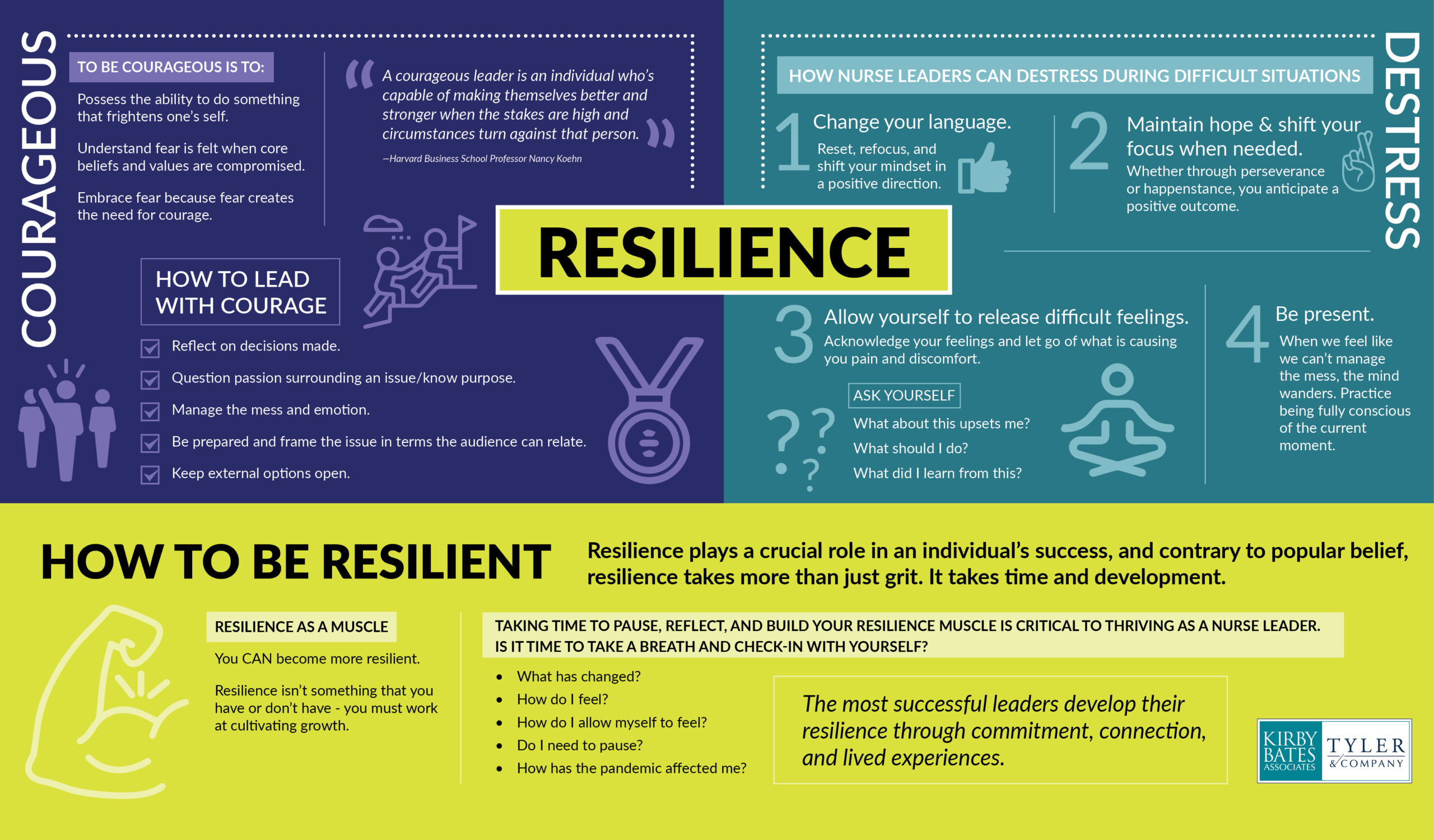By Pamela Hunt, MSN, RN, NEA-BC, FAAN
There is currently much written about resilience, but for those in leadership, finding personal resilience without first understanding, the need for courage will lead to personal conflict. In this article, we discuss how healthcare leaders can find the strength to demonstrate courageous leadership every day and why It’s a critical pillar of exceptional leadership.
Defining Courage
Courage is the choice and willingness to confront agony, pain, danger, uncertainty, or intimidation. As healthcare leaders, we are called upon to demonstrate both physical courage and moral courage daily.
To be courageous is to:
- Possess the ability to do something that frightens one’s self.
- Understand that fear is felt when core beliefs and values are compromised.
- Embrace fear because fear creates the need for courage.
“A courageous leader is an individual who’s capable of making themselves better and stronger when the stakes are high and circumstances turn against that person.” —Harvard Business School Professor Nancy Koehn
What Does it Mean to Lead with Courage?
- Reflect on decisions made.
- Question passion surrounding an issue and know its purpose.
- Manage the mess and emotion.
- Be prepared and frame the issue in terms the audience finds relatable.
- Keep external options open.
“Courage comes in many forms. Only occasionally is it acts of heroism on the battlefield. More often it is in the form of small decisions that few can see but which, when added together, produce significant results that many admire.” —International Speaker, Margie Warrell
How Does Risk Relate to Courage in Leadership?
As healthcare leaders, we have to face risk to find courage, especially in times of crisis. The higher someone is in an organization, the more at risk the person is when they demonstrate courage. Often leaders may feel like their job is at risk every day. You may think you know where your values lie and are unwilling to compromise those values, especially if it is a core value. It’s easy to talk about, but it’s more difficult when you have to experience it.
Healthcare leaders must ask themselves, ‘What does it take for ME to have courage?”
Often that answer is three-fold:
1. Passion.
2. Ability to manage the message.
3. Recognize the positive of post-traumatic growth.
Each time you choose to take action in the presence of fear, you lessen its power over you.
How Leaders Can Destress During Difficult Situations
1. Change your language. When you choose to experience living in the moment, you learn from the situation you are in and recognize that you have the power to change. Are you the pessimist or the optimist? Maybe it’s time to reset, refocus, and shift your mindset in a more positive direction.

2. Maintain hope and shift your focus when needed. Hope is the belief in a better future and maintaining the expectation that something good is on the horizon. Whether through perseverance or happenstance, you anticipate a positive outcome—a key component in building resilience.
3. Allow yourself to release difficult feelings. To move forward, you must acknowledge your feelings and let go of what is causing you pain and discomfort. You may face a situation during the pandemic in which you want to help, but can’t. How you process those feelings is imperative to your growth as a leader.
Ask yourself:
- What about this upsets me?
- What should I do?
- What did I learn from this?
“To let go does not mean to get rid of. To let go means to let be. When we let be with compassion, things come and go on their own.” –Jack Kornfield, PhD
4. Be present. When we feel like we can’t manage the mess, the mind wanders. Practice being fully conscious of the current moment. Use this time to listen and connect with others around you.
Once you have developed a plan to cultivate your courage, building resilience is within reach.
Read, ‘5 Self Care Tips to Promote Worklife Balance.’
The Role of Resilience

Resilience plays a crucial role in an individuals’ success, and contrary to popular belief, resilience takes more than just grit. It takes time and development. Think of resilience like a muscle, requiring sustained attention to building capability in several specific skills.
Resilience as a Muscle
- You CAN become more resilient.
- You have to practice to work that muscle.
- Resilience isn’t something that you have or don’t have – you must work at cultivating growth.
High-performing leaders facilitate the hard conversations, create accountability, and inspire action; however, this isn’t innate knowledge. The most successful leaders develop their resilience through commitment, connection, and lived experiences.
Taking time to pause, reflect, and build your resilience muscle is critical to thriving as a healthcare leader.
Is it time to take a breath and check-in with yourself?
- What has changed?
- How do I feel?
- How do I allow myself to feel?
- Do I need to pause?
- How has the pandemic affected me?
Find Your Courage
As described in the article, ‘Nurse Leader Resilience: Career Defining Moments’ written by Susan Cline, MSN, MBA, RNC, NEA-BC:
“Nurse leaders have a professional obligation to develop resilience in themselves, the teams they supervise, and the organization as a whole. Additional benefits include reduced turnover, reduced cost, and improved quality outcomes through organizational mindfulness.”
As leaders, we owe it to ourselves and those we serve to develop a plan to lead intentionally, with courage. Amid a global pandemic, the likes of which we have not seen in our lifetime, remember, a crisis does not create leaders — it reveals them.
Kirby Bates Associates drives healthcare organizations to achieve high quality, cost-effective patient care through our comprehensive portfolio of proven leadership services, including Executive Search, Interim Leadership, and Executive Advisory Services. As successful healthcare executives, our effective and inclusive approaches deliver sustainable solutions for our clients’ greatest leadership challenges.
Contact us to learn more about achieving sustainable outcomes for your executive, operational, and clinical leadership teams.
Additional Reading
—
About the Author
 Pamela Hunt is nationally known as a nurse executive, author, financial, quality, safety and strategic expert, and community leader. She has delivered over 500 nursing and healthcare leadership presentations and published on workforce development, strategic planning, connecting to the purpose of our profession, and most notably, healthcare finance. Her pioneering work in improving the financial acumen of healthcare has enabled thousands of leaders to develop and defend successful proposals and ROI to ensure quality patient outcomes.
Pamela Hunt is nationally known as a nurse executive, author, financial, quality, safety and strategic expert, and community leader. She has delivered over 500 nursing and healthcare leadership presentations and published on workforce development, strategic planning, connecting to the purpose of our profession, and most notably, healthcare finance. Her pioneering work in improving the financial acumen of healthcare has enabled thousands of leaders to develop and defend successful proposals and ROI to ensure quality patient outcomes.
An experienced operational leader, she has led significant safety improvements in the acute care setting. Recognizing that quality patient care is led by a healthy workforce, Pam’s focus on healthy work environments, caregiver engagement, and self-care practices have been hallmarking in her career.
In addition to serving on the editorial board of Nursing Management, the Journal of Excellence in Nursing Leadership, Pam has served on community and non-profit boards impacting the advancement of population health and the nursing profession for over 25 years. Through successful legislative efforts working with the AHA, all Indiana high school students are required to learn hands-only CPR and Marion County is smoke-free in public spaces.
Pam is a graduate of Parkview-Methodist School of Nursing. She received a BS from Indiana Wesleyan University and an MSN from Indiana University. She is currently a DNP student at the University of Southern Indiana. Pamela is a fellow of the American Academy of Nursing.
—
References
- Brennan, E. J. (2017). Towards resilience and wellbeing in nurses. British Journal of Nursing, 26(1), 43-47. doi:10.12968/bjon.2017.26.1.43
- Clancy, T. R. (2003). Courage and Todayʼs Nurse Leader. Nursing Administration Quarterly, 27(2), 128-132. doi:10.1097/00006216-200304000-00006
- Detert, J. (November-December 2018). In many stories we hear about workplace courage. Harvard Business Review, 130-135.
- Edmondson, A. C. (March 06, 2020). Don’t Hide Bad News in Times of Crisis. Harvard Business Review, 2-4.
- Mininni, D. (2006). The emotional toolkit: How to cope with what life throws at you. London: Piatkus.
- Saletnik, L. (2018). Building Personal Resilience. AORN Journal, 107(2), 175-178. doi:10.1002/aorn.12067

